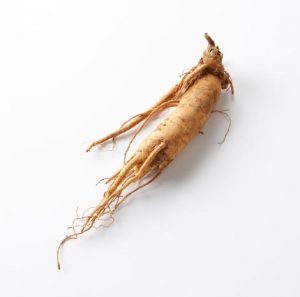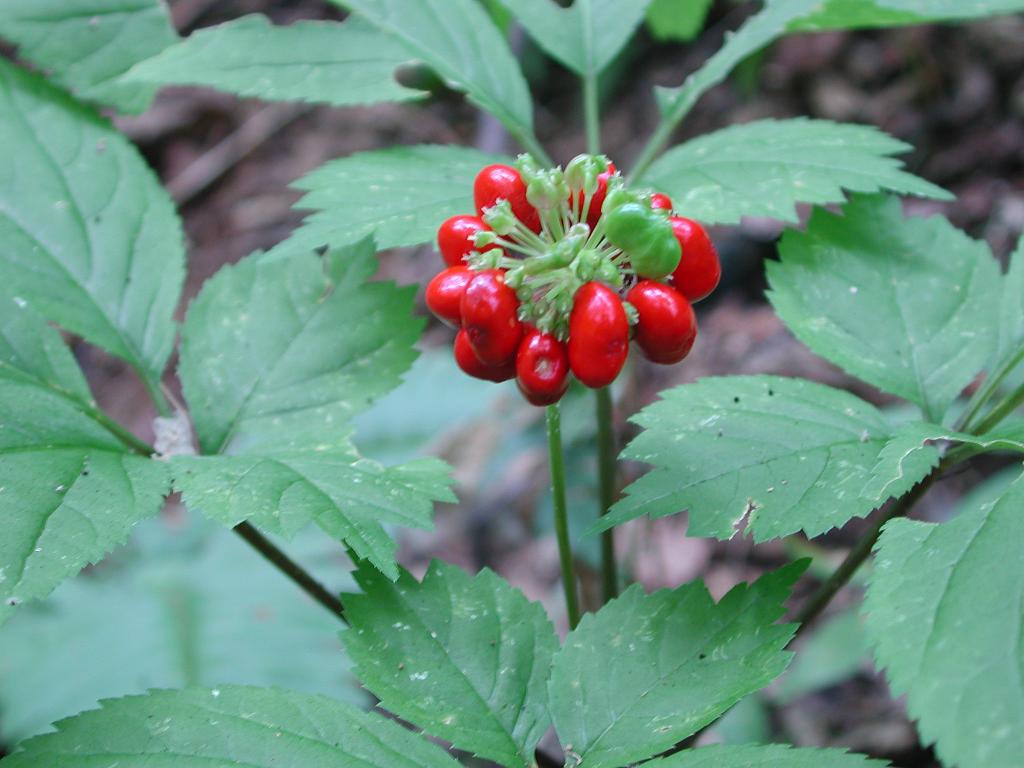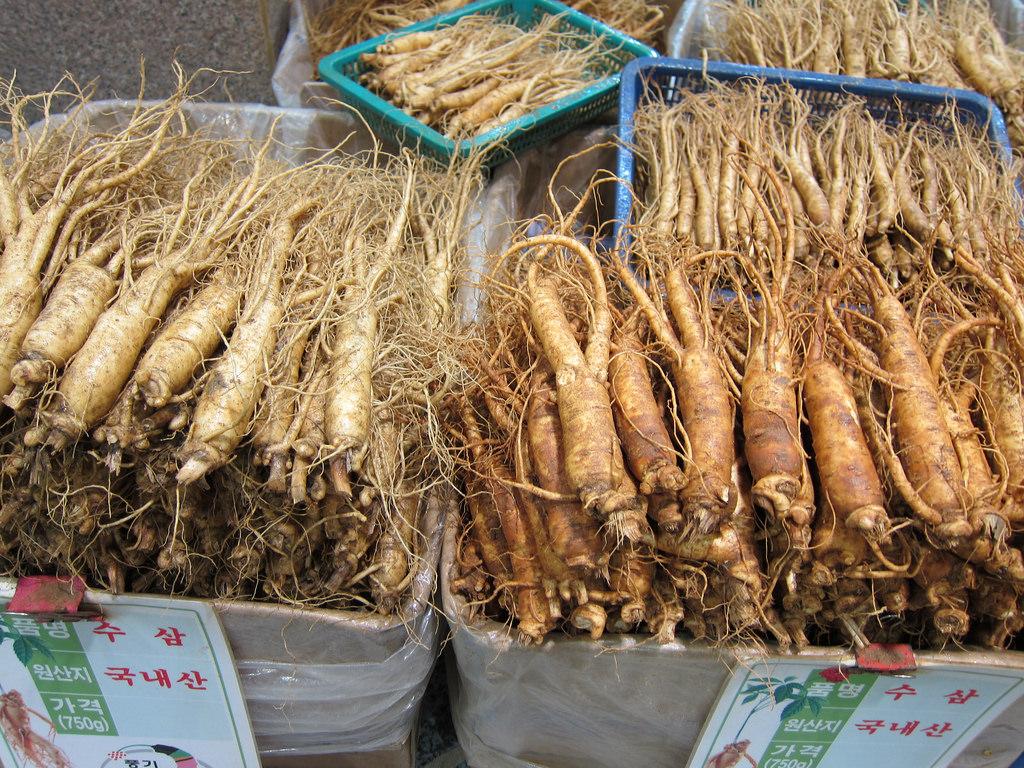Both Asian and American ginseng seem to have minor blood sugar control benefits.

- Supporting insulin. Ginseng may enhance insulin secretion, binding, and sensitivity.
- Promoting glucose transport. Ginseng may increase the movement of sugar from the bloodstream into cells.
- Reducing glucose absorption. Ginseng may reduce the absorption of sugar in the digestive tract.
Overview
Ginseng refers to a group of plants recognized for their medicinal effects. The two most-widely used types of ginseng are Panax ginseng, also known as Asian, Chinese, and Korean ginseng, and American ginseng (Panax quinquefolius).
Ginseng has a long history of use in traditional Chinese medicine, and today it is one of the most popular dietary supplements worldwide. Ginseng preparations are made from the roots, which contain the highest concentrations of active ingredients.
Ginseng is considered an adaptogen – a herb which helps the body cope with stress. This includes not just the psychological stress most of us experience but also physiological stress such as temperature changes, sleep deprivation, and infection. Because of this, ginseng has a wide range of uses, including:
- Enhancing immunity
- Lowering cholesterol
- Boosting energy & workout performance
- Improving mood and other nootropic uses
- Boosting testosterone
- Improving overall health
In addition, both Asian and American ginseng are used for blood sugar control. Human research seems to support their efficacy, although clinicians remain skeptical.

How Ginseng Might Help With Blood Sugar
Researchers have identified the main active ingredients in ginseng, a class of compounds called ginsenosides. Researchers are not yet entirely sure how they work to lower blood sugar, but research-support theories include:
Supporting insulin
Studies show that ginseng may interact with insulin in several ways, such as increasing insulin sensitivity and enhancing insulin secretion and binding. 1
Improving glucose transport
Glucose transport refers to the movement of glucose (sugar) into cells. Ginseng preparations have been demonstrated to increase glucose transport and uptake, resulting in less sugar staying in the bloodstream. 2
Reducing glucose absorption
Some studies report that ginseng reduce the absorption of glucose in the digestive tract, which would result in less sugar reaching the bloodstream. 3
Ginseng Uses & Benefits for Blood Sugar
Some people with hyperglycemia, prediabetes, or type 2 diabetes use Asian ginseng to lower their blood sugar levels. American ginseng is used as well, although it is not nearly as popular as its Asian counterpart.
Most human studies of the effects of Asian and American ginseng on blood sugar report minor improvements. However, a few studies have reported no effect, and there is a great deal of variability depending on the exact ginseng preparation used, such as white versus red ginseng.
Nonetheless, the latest systematic review of all available high-quality studies assessing the glycemic effects of ginseng concluded that “Ginseng modestly yet significantly improved fasting blood glucose in people with and without diabetes.” As such, research data supports the use of ginseng for lowering blood sugar. 4

Research
Human Research
Human studies of Asian and American ginseng are mostly positive and report improvements in blood sugar levels. However, many of these studies are not of the greatest quality, and clinical experts are not ready to recommend the use of ginseng for hyperglycemia.
Asian ginseng extract (G115, 200-400 mg) appears to reduce fasting blood sugar
This report assessed the results of two randomized, double-blind, placebo-controlled studies evaluating the effects of Panax ginseng (G115 standardized extract) on blood sugar. In the first study, 30 people fasted overnight and were given placebo, G115 200 mg, or 400 mg. In the second study, 27 fasted people were given placebo, glucose, G115 200 mg, or G115 plus glucose. Both studies showed that a single dose of Asian ginseng by itself reduced fasting blood glucose levels.
- The researchers concluded that “These data have implications for the use of ginseng in individuals with poor gluco-regulation.” 6
Asian ginseng preparation (6 g) may help control blood sugar, but the effect is not very strong
This randomized, double-blind, placebo-controlled, crossover study evaluated the anti-diabetic effects of Korean red ginseng (KRG). Nineteen people with type 2 diabetes took a KRG preparation (2 g/meal, 6 g/day) or placebo daily for 12 weeks before a meal. They later switched groups. Compared to placebo, the KRG group did not experience a reduction in mean glucose levels (HbA1c). However, KRG treatment improved other markers of blood glucose and decreased blood insulin levels.
- The researchers concluded that “Although clinical efficacy, as assessed by HbA1c, was not demonstrated, 12 weeks of supplementation with the selected KRG treatment maintained good glycemic control and improved PG and PI regulation…” 7
Asian ginseng (2. 2 g) may improve insulin resistance in diabetics
This randomized, double-blind, placebo-controlled, crossover study examined the effects of P. ginseng on diabetes. Twenty type 2 diabetics were given placebo or ginseng capsules (2.2 g total) daily for 4 weeks, and switched groups after 2 more weeks. The ginseng group experienced a greater decrease in HOMA-IR, a method of evaluating insulin resistance.
- The researchers concluded that “…HOMA-IR and fasting glucose decreased significantly (p < 0.05) with 4 weeks of ginseng treatment compared with placebo…” 8
Asian ginseng (100-200 mg) appears to improve fasting and mean blood sugar levels
This randomized, double-blind, placebo-controlled study evaluated the effects of ginseng on type 2 diabetes. A total of 36 participants were given placebo or ginseng (100 or 200 mg) daily for 8 weeks. The ginseng groups experienced a reduction in fasting blood glucose, and the 200 mg groups also improved in Hba1c levels.
- The researchers concluded that “Ginseng may be a useful therapeutic adjunct in the management of NIDDM.” 9
American ginseng (3 g) may reduce postmeal blood sugar
This randomized, double-blind, placebo-controlled study evaluated the effects of American ginseng on blood sugar. Nine people with type 2 diabetes and 10 without were given placebo or American ginseng (3 g) capsules 40 minutes before or together with 25 g of sugar. Ginseng reduced postprandial blood sugar in diabetic participants when taken at either time, but only reduced blood sugar in nondiabetics when taken 40 minutes before eating sugar.
- The researchers concluded that “American ginseng attenuated postprandial glycemia in both study groups.” 10
Different ginseng preparations (1-9 g) may have varying effects on blood sugar
This randomized, single-blind, placebo-controlled, crossover study evaluated the effects of Asian ginseng on blood sugar. Eleven people were given a single dose of placebo, or Asian ginseng (1, 2, or 3 g). In addition, a separate trial tested placebo vs 3, 6, and 9 g of Asian ginseng.
Asian ginseng had no significant effect on blood sugar, and the combination of all the data revealed that mean two-hour blood glucose levels were actually higher when taking ginseng. The researchers noted that these results were unexpected, and may be explained by composition differences between individual Asian ginseng preparations.
- The researchers concluded that “Asian ginseng showed both null and opposing effects on indices of acute postprandial plasma glucose and insulin. Practitioners and consumers should be aware of ginseng’s variable effects.” 11
Asian ginseng does not appear to improve blood sugar control in healthy individuals
This report examined two randomized, double-blind, placebo-controlled studies evaluated the effects of Asian ginseng on blood sugar. Both studies gave Asian ginseng to healthy individuals over a period of several weeks, and reported no effect on any measure of blood glucose.
- The researchers concluded that “…chronic use of Panax ginseng by non-diabetic individuals will have little long-term effect on glucose regulation.” 12
Dosage for Blood Sugar
- Studies have used different ginseng preparations, making it difficult to determine the ideal dosage
- Both Asian and American ginseng supplements typically come in 1000 mg capsule dosages
- Multi-ingredient blood sugar supplements contain smaller dosages (~200 mg)
Available Forms
- Asian ginseng is the most widely used and researched form of ginseng, followed by American ginseng. These two species of ginseng contain the same class of active ingredients (ginsenosides), but have different compositions.
- Ginseng root. Basic powdered ginseng root sold in capsules.
- Ginseng complex. A combination of Asian ginseng and American ginseng, with a larger amount of Asian ginseng.
- Ginseng extract. Some supplements are standardized to contain 4 – 8 % percent ginsenosides (the main active ingredient).
- Ginseng tea. Ginseng root can be used to brew a stimulating tea.
Supplements in Review Recommendation
- Ginseng, 1+ g for blood sugar, as Asian or American ginseng.
Ginseng may provide minor blood sugar benefits. Although researchers stress the need for further high-quality studies of ginseng, existing research evidence reports small improvements in blood sugar levels in both healthy and diabetic individuals.
We recommend dosages of 1 g or more. Because both Asian and American ginseng have been shown to reduce blood sugar, you can try either or use a combination formula. However, keep in mind that Asian ginseng has more research support.
Leave a Reply